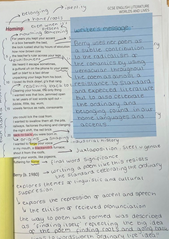There has been a lot of interest recently in vocabulary and how it should be taught. For example, if you google ‘the vocabulary gap’ you get page after page of references to books and articles about the subject, originating largely in the USA but now spawning a lot of pedagogic advice and teaching material in the UK as well. For example, there’s a new book by Alex Quigley coming out at the end of this month devoted to this subject, entitled Closing the [Vocabulary] Gap. The main idea behind all of this is that some children come into school with a very large vocabulary ‘deficit’ – they simply don’t know as many words as other, more advantaged children. What follows from this, so the argument goes, is that this vocabulary gap makes reading more difficult and the answer is to teach them more words. It seems logical. If they encounter a text with too many words that they don’t know, they’ll struggle with it. So pre-teach the words to allow them to understand it better. The advocates of this approach are aware that closing the vocabulary gap by teaching individual words has some problems. How on earth do you teach enough words to make a difference? So they recommend being selective. They identify ‘tiers’ of words, from the everyday to the specialist and encourage teachers to identify which are the priority words. Nevertheless, the broad message is that it is, above all, word knowledge that impedes confident reading and that creating confident readers entails teaching them more words.
It seems to me, even from a common sense perspective, that this approach demonstrates a rather limited view of what confident reading entails, both for young learners and for adults. While I recognise that pupils’ lack of understanding of words might inhibit their free and confident ability to read difficult texts and agree that work in the classroom undoubtedly needs to include some focus on vocabulary to support readers and develop their interest in words, I’m doubtful about the pre-eminence given to it above all other aspects of language. Equally I’m not convinced about some of what follows from this emphasis, such as substantial amounts of pre-teaching vocabulary before students read texts.
Some of my doubts stem from serious concerns about the basis upon which the claims for vocabulary are made. In a previous blog discussing the work of Arthur Applebee I examine some of E.D. Hirsch's assertions about reading tests, vocabulary and knowledge, raising questions about the premises upon which his views are based and the failure to distinguish between learning in subjects (concepts and terminology) and the ability to ‘read’ in broader terms.
Even Hirsch acknowledges that the way most words are learned most effectively is by ‘massive immersion’:
Most vocabulary growth results incidentally from massive immersion in the world of language and knowledge… It has long been known that the growth of word knowledge is slow and incremental, requiring multiple exposures to words. One doesn’t just learn a word’s meaning and then have the word. One gradually learns the word’s denotations and connotations and its modes of use little by little over many, many language experiences.
In Reading Comprehension Requires Knowledge – of Words and the World, by E.D. Hirsch (2003)
Andrew McCallum and Kate Oliver have also written excellent blogs about vocabulary, exploring how understanding words in context is a very different thing from knowing how to define them, and showing how reading is a set of complex, interconnecting skills and knowledge. Kate also offers strategies for teaching vocabulary in its context.
Here I want to take a slightly different approach, looking at the other ways in which texts can create difficulty for inexperienced readers, that have nothing to do with unfamiliar vocabulary, to question the case for a vocabulary-heavy pedagogy. I’d argue that we need to focus on these, as much as lexical knowledge, if we want to support our students in becoming more confident and fluent readers of texts. I’d also even argue that focusing too much on vocabulary runs the risk of damaging students’ ability to read difficult texts.
What makes difficult texts difficult to read?
1. There is a serious argument that understanding texts is much more about being able to grasp the big picture, rather than understanding every word or even understanding every individual sentence. It’s about recognising the bigger structures and distinguishing between what is significant and what is not, what point is being made, deciding whether it’s just the preamble or a wider development of the most important point. This judgement comes not from an understanding of every item of vocabulary but rather from the ability to read quickly and broadly, with a strong sense of what leaps out as the line of argument, or as the most significant idea. In a way it’s a ‘summarising on the hoof’ or ‘summarising in your head’. You bring some information to the fore and let other items slip into the background, to make the process of reading manageable. Once you have an overall sense of what the text is doing, you can go back, if you want to, and fill in the gaps in terms of detail, understanding what role the detail is playing and whether it’s worth bothering to explore it more fully. You can also often understand more about what individual words mean, because of the context surrounding them.
Linguist Katherine Pereira is very interesting on this:
Even if the reader can understand all the technical vocabulary of the passage and has no difficulty at sentence level he may still not be able to make sense of the text as a whole. There are frequent instances of pupils understanding all the constituent sentences of a passage and yet not understanding the relationship between them, i.e. not understanding the relationship between them, i.e. not understanding the point that is being made. Pupils will frequently remember a dramatic or vivid example without having any idea of the generalisation it was intended to exemplify.’
In ‘The Assessment of Linguistic Difficulty in Reading Material’, Linguistics and the Teacher, Vol 112 (Routledge), ed. Ron Carter (2006)
Getting a sense of the big picture – of a whole sentence, paragraph or bigger section – is particularly difficult for students who read slowly. By the time they’ve got to the end of a long sentence, they can’t remember where it started. By the time they reach the end of the paragraph, the beginning is a blur. So what’s the answer to this? Slowing it down with lots of work on vocabulary? Or reading faster, in the first instance, to get the gist and see what the writer is wanting us to get from the writing?
2. Long sentences and complex syntax, often associated with writing from previous eras but also associated with much academic writing and non-fiction, is a significant challenge for inexperienced readers. The vocabulary of a specialist non-fiction text, written in a subject domain like geography or science, is obviously a barrier to understanding for a non-specialist reader. Learning the subject is learning its concepts and associated vocabulary. But equally, both in specialist texts, and in more general reading of demanding texts, of the kind that we do with students in English, and of the sort we want to teach students to be competent to read in their future lives, it is often syntax more than vocabulary that can get in the way of comprehension. Again, the linguist Katherine Pereira has done brilliant analyses of the sentence length and syntactic patterns of non-fiction texts compared with fictional ones, and demonstrated why it might be that students encountering non-fiction might struggle with it.
Pereira says:
The average sentence length for ‘general fiction’ is fourteen words and for ‘learned and scientific writings’ twenty-four words. So, on average, sentences in textbooks can be expected to be roughly twice as long as sentences in fiction … Long sentences such as these with complex internal relationships place greater burdens on the reader’s Short Term Memory and on his syntactic abilities.
Of course, when it comes to reading texts from the past, this is also a very significant issue. Mean sentence length is around 50% more for texts written 100 years ago and this will inevitably cause challenges for students reading a nineteenth century novel and pre-twentieth century non-fiction in GCSE specifications.
Pereira argues that it is often complex syntax that creates the most difficulty regardless of sentence length. Speeding up reading (and showing them the benefits of reading aloud, under their breath, or in their head) can help students to get to the end of a main clause, and recognise the subsidiary importance of the relative clauses that provide the ‘extra information’ along the way.
3. For all that we talk about the detrimental impact of the ‘vocabulary gap’ on reading, it can be the simple words, used in idiomatic or unusual ways that can floor inexperienced readers, pulling the rug out from under their feet. Floor? Rugs? That last sentence is just one example of potentially confusing language where the words themselves are perfectly simple, monosyllabic, everyday ones, yet they’re being used in ways that might not be familiar. It might be no less difficult for a student to understand this idiomatic use of language than it would be for me to say, ‘It can be the simple words that can be disconcerting, capable of disorientating inexperienced readers.’ Only seeing vocabulary as hard words misses out a much bigger aspect of what it means to understand a text.
We all know too, that some of the most complex texts we might read in the literary canon - the most difficult to comprehend - are made up of predominantly simple words, used in elliptical or unexpected ways. Think William Carlos Williams, Beckett, Sylvia Plath or these lines from T.S.Eliot’s Four Quartets:
Time present and time past
Are both perhaps present in time future
And time future contained in time past.What might have been and what has been
Point to one end, which is always present.
Exemplifying these views on reading in a commonly taught text
A Christmas Carol is often quoted an example of a text that is chocabloc with words that will get in the way of students’ comprehension of the text. Dickens uses a whole host of words that, I think we’d all agree, are not likely to be well-known to many students and could make reading the novel a challenging experience, especially if they felt they needed to understand all of them. You could decide that the answer is to focus on the vocabulary and pre-teach it before reading the text. However, it seems to me that the other demands and prerequisites for successfully reading, understanding and enjoying the text are just as important, if not more so, and therefore spending too much time on vocabulary, before and during reading, might actually be counterproductive.
To demonstrate this, take a look, yourself, at the opening of A Christmas Carol. Read it as you would the opening of any novel, then think about what you were doing as an experienced reader. Were you reading every sentence, slowly, to understand every word? What happened when you encountered something hard to follow (as I did in the very first sentence!)?
MARLEY was dead: to begin with. There is no doubt whatever about that. The register of his burial was signed by the clergyman, the clerk, the undertaker, and the chief mourner. Scrooge signed it: and Scrooge’s name was good upon ‘Change for anything he chose to put his hand to. Old Marley was as dead as a door-nail.
Mind! I don’t mean to say that I know, of my own knowledge, what there is particularly dead about a door-nail. I might have been inclined, myself, to regard a coffin-nail as the deadest piece of ironmongery in the trade. But the wisdom of our ancestors is in the simile; and my unhallowed hands shall not disturb it, or the Country’s done for. You will therefore permit me to repeat, emphatically, that Marley was as dead as a door-nail.
Scrooge knew he was dead? Of course he did. How could it be otherwise? Scrooge and he were partners for I don’t know how many years. Scrooge was his sole executor, his sole administrator, his sole assign, his sole residuary legatee, his sole friend, and sole mourner. And even Scrooge was not so dreadfully cut up by the sad event, but that he was an excellent man of business on the very day of the funeral, and solemnised it with an undoubted bargain.
The mention of Marley’s funeral brings me back to the point I started from. There is no doubt that Marley was dead. This must be distinctly understood, or nothing wonderful can come of the story I am going to relate. If we were not perfectly convinced that Hamlet’s Father died before the play began, there would be nothing more remarkable in his taking a stroll at night, in an easterly wind, upon his own ramparts, than there would be in any other middle-aged gentleman rashly turning out after dark in a breezy spot – say Saint Paul’s Churchyard for instance – literally to astonish his son’s weak mind.
Scrooge never painted out Old Marley’s name. There it stood, years afterwards, above the warehouse door: Scrooge and Marley. The firm was known as Scrooge and Marley. Sometimes people new to the business called Scrooge Scrooge, and sometimes Marley, but he answered to both names: it was all the same to him.
Oh! But he was a tight-fisted hand at the grindstone, Scrooge! a squeezing, wrenching, grasping, scraping, clutching, covetous, old sinner! Hard and sharp as flint, from which no steel had ever struck out generous fire; secret, and self-contained, and solitary as an oyster. The cold within him froze his old features, nipped his pointed nose, shrivelled his cheek, stiffened his gait; made his eyes red, his thin lips blue; and spoke out shrewdly in his grating voice. A frosty rime was on his head, and on his eyebrows, and his wiry chin. He carried his own low temperature always about with him; he iced his office in the dog-days; and didn’t thaw it one degree at Christmas.
External heat and cold had little influence on Scrooge. No warmth could warm, no wintry weather chill him. No wind that blew was bitterer than he, no falling snow was more intent upon its purpose, no pelting rain less open to entreaty. Foul weather didn’t know where to have him. The heaviest rain, and snow, and hail, and sleet, could boast of the advantage over him in only one respect. They often ‘came down’ handsomely, and Scrooge never did.
When you’ve read it and thought about your reading strategies and responses, look at mine to see how far they match up with yours.
- I struggled with the ‘Scrooge’s name was good upon ‘Change for anything he chose to put his hand to’ but I just ignored that and read on.
- I latched onto ‘Old Marley was dead as a door-nail’ as the first really certain, important thing. I thought it was a pretty unsentimental way of describing Marley’s death.
- In the paragraph starting ‘Mind!’ I recognised that the voice was playing with the idea of the door-nail metaphor, in quite a jokey way. By the time I was two or three sentences in, I’d got that that was what he was doing and switched off a bit before tuning back in for the repeated ‘Old Marley was dead as a door-nail.’ I realised we were back from the digression about the door-nail metaphor. I didn’t know – and still don’t really know – what ‘assign’ or ‘residuary legatee’ mean but I got the gist from everything else and read on, rather than looking them up in a dictionary. Scrooge was his only friend and his partner at work, and the only person at his funeral – so bound together that people mistook one for the other. That was enough for me.
- In the next paragraph, there’s that narrator drawing attention to himself and backtracking again. It seems to be more to do with giving me a sense of the narrator’s voice than anything else. The reference to Hamlet and Hamlet’s ghost is interesting, if you know the play, and possibly worth coming back to at a later stage, but not really essential at this point. It’ll slow the reading down to spend too long working it out, so I don’t bother but subliminally there’s something about ghosts coming back to haunt you that has been implanted in my head.
- Ah now! The paragraph about Scrooge and Marley is important. No tricky vocabulary at all, but it says so much and so well. Mentioning the two names together so often suggests that in life they were inseparable - a double act. It starts making me wonder what about now, when Marley is dead – as a door-nail. What’s going to happen to Scrooge? He hasn’t painted Marley’s name out. Why not?
- And now we have a great long paragraph describing Scrooge. After all the preamble of the opening (which is basically telling us that Marley is dead, and that we have a very lively narrator who wants to both make us laugh and think a bit, but mainly laugh), we now have a fantastic description of the character Scrooge, the one who is still living. I recognise all the words here but there are a few that might cause particular difficulty for students, ‘grindstone’, ‘covetous’, ‘gait’, ‘shrewdly’. I can get the general gist without knowing these – his hardness and sharpness, ‘the cold within him’, a frostiness that echoes the Christmas season are all clearly evoked.
- The subsequent paragraph develops this further – brilliantly – with hardly any tricky vocabulary at all.
- I’ve got to this point and am rather pleased I didn’t over worry about the beginning or spend too long on it because this is amazing stuff now. I’m getting a strong sense of the main character, with his dead partner, Marley, and the set-up and I’m raring to go.
- After I’ve read the first chapter, I might go back to those paragraphs I read really quickly to remind myself of them and just check that I haven’t missed something important. In fact, now that I do, I see it says, ‘Marley was dead, to begin with.’ Very odd, that ‘to begin with’. Perhaps Marley and Scrooge aren’t going to be separated after all, even though Marley is ‘dead as a door-nail’. There are just six words in that first sentence – all of them easy, monosyllabic ones apart from the name – and yet now I look back, I realise just how much they were telling me, if only I’d paid attention! Dickens’s ‘to begin with’ seems far more important to me than ‘assign’ or ‘residuary legatee’.
I’m not arguing that vocabulary isn’t important. There will be times when knowing a particular word is vital. But there will be just as many times when other understandings about reading are employed, or when speed is more important than punctiliousness over word knowledge, to help students reach the end of a sentence or a paragraph and hold onto the meaning. Equally, there’ll be lots of occasions when the meaning is quite opaque to students, despite the fact that every word is a common, everyday monosyllabic one. Let’s teach vocabulary but recognise that it’s not the fairy godmother of reading, waving the wand that opens up comprehension on every occasion. It’s one of a complex array of reading and comprehension strategies that need to be taught alongside it.
For more about teaching vocabulary see:
Bringing Words to Life, by Isabel L Beck, Margaret G. McKeown and Linda Kucan




